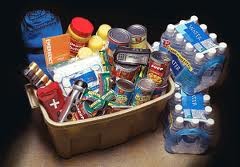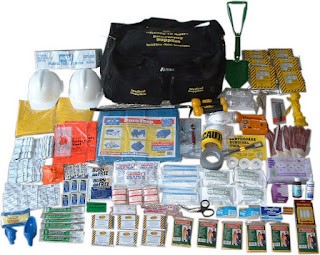In the event you and your family are stuck at home when the electricity goes out, due to a storm, or emergency, it is always good to be prepared. Your home emergency plan should consist of all the items in your mobile kit, plus more essentials in case you're stuck for a week or so without electricity. Here is a suggested list to think about when creating that "At home" emergency kit.
Generator to protect that food in your freezer and fridge. A
generator can also be used to charge cell phones, laptops, rechargeable
batteries for small items. (Never use rechargeable batteries for emergencies,
they don't last as long as normal batteries.)
Batteries for flashlights, plus extras.
Fire Extinguisher - every kitchen should have one of these,
but it is good to have an extra on hand should there be a fire produced during
a storm. Two is better than one in an emergency.
Cash and change - if you're without power, so will those
stores around you that might be open. ATM machines will not be operational
either, so please have cash readily available for emergencies.
Food - dry and canned food to last you at least 1-2 weeks if
necessary.
Cereal - dry
Camping stove, or BBQ Gas Grill to cook on. Try not to use
your indoor stove if it is gas. You never know if there is a break in the gas
line in your area.
Water - 1 Gallon per person per day for personal hygiene and
cleaning. Buy additional for cooking too.
Buy 1 case of water (24 bottles) per person for three days. Don't forget
to save those 3-liter soda bottles to be used to fill up with water for the
animals.
Snacks: Dried nuts, peanut butter, jelly (individual packets
if possible), granola bars, saltines, dried fruit
Drinks: Canned juices, or individual drink packets to use in
water bottles. Best suggestion is buying a few tall 1-liter bottles of water to
use with packets. Try to stay away from carbonated drinks if possible, during
an emergency because they will make you thirstier.
Dry Milk that requires water to use for cooking or cereal.
Powdered creamer for coffee or tea.
Sugar in plastic container.
Tools: Pliers, wrench and screwdriver. Be sure to turn off
all utilities, especially gas during an emergency. If there is a break in the
line it could cause hazardous results to your home.
If you're in a flood zone, you might consider investing in
one of those inflatable boats to ensure you can vacate via water. (Plus they come in handy on those hot days if
you don't have a pool - inflate and fill with water to cool off, then deflate,
dry off and restore until needed again.)




Comments
Post a Comment